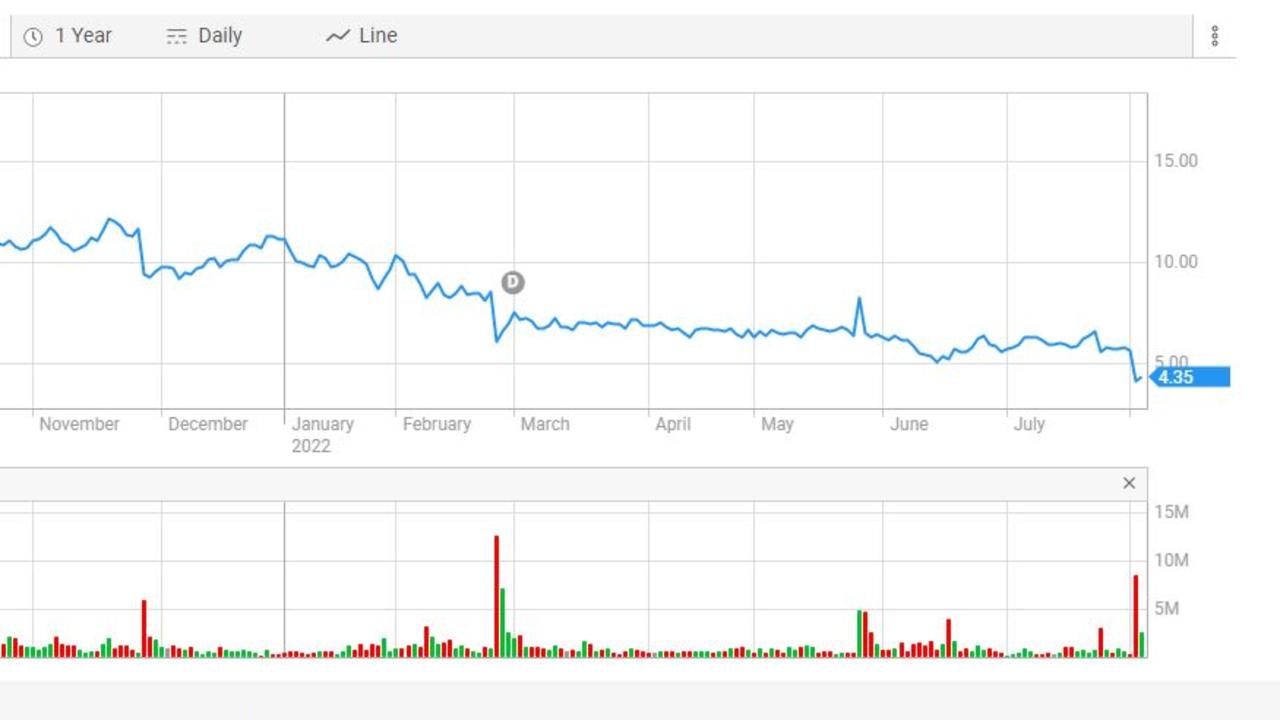An Australian social media start-up that was recently valued at $1.78 billion is sacking 17 per cent of staff from its global operations.
The company, whose main offices in Australia are based in Sydney and Melbourne, said it has 25 million users and is one of the top 300 most popular websites globally with 1.2 billion monthly views.
Yet, his co-founder and chief executive Alex Zaccaria, revealed on LinkedIn that he was “heartbroken” to announce that staff would be axed.
The news came despite the company, which has been backed by billionaire Afterpay co-founder Nick Molnar, raising $US110 million ($A1578 million) in March.
It also announced a brand transformation in June and revealed plans for a whole suite of new tools and features set to be released over the coming months.
The company is believed to have around 300 employees, with the 17 per cent figure equating to around 50 staff that will be sacked, with roles impacted understood to cover talent acquisition, people and culture, design and marketing.
Mr Zaccaria said he had shared the “difficult news” with staff about the cuts, which were being made to “emerge stronger from the economic downturn”.
“Our people have built Linktree into what it is today: trusted by millions of people around the world. I’m heartbroken to say goodbye to some incredible teammates today, and want to do all I can to support them,” he said.
“On Friday, we will post a public, opt-in Airtable for those of our team impacted and ask you to please consider this group of incredibly talented and passionate people for roles you have open. I can assure you they will make huge contributions wherever they land.
“If you’d like to speak to me personally about any individual, my DM’s are open.”
The cuts come after the company introduced a $6000 reward annually to staff just six months ago, with the perk described as “mind-blowing” by employees at the time.
Linktree started off as a way for influencers to link to everything from their outfits, blog posts, podcast episodes and social media, but has evolved into a platform that enables brands, artists and businesses to monetize their content through social media.
Its high-profile users feature Selena Gomez and Dwayne ‘The Rock’ Johnson as well as brands such as TikTok and Red Bull.
Mr Zaccaria also revealed that the company had made some “big bets” and hired in line with its ambitions, but economic conditions had changed in 2022 forcing the company to make the cuts.
“Conditions changed faster than expected and those assumptions I made were wrong,” he said. “I have many learnings to take into the next phase of building Linktree. That next phase involves narrowing our focus on our long-term strategy by reducing roles that are no longer aligned with our road map.”
In a further letter to Linktree staff, Mr Zaccaria said he would be hosting a weekly ‘Ask Me Anything’ session to staff for the next four weeks.
“Friday will be a company-wide mental health day at Linktree. For a company like ours, so focused on culture and camaraderie, this will be difficult news,” he said.
“I don’t expect anyone to be their normal selves. We will also be allocating you an additional mental health day that you can take at a time that suits you.
“The opportunity for Linktree is immense and I have no doubt we’ll achieve everything we intend to and more for our creators.
“The right path is rarely the easy path. Today’s change to our team is the hard way, but it puts us in a strong position to deliver on the opportunity we have in front of us.”
Staff that have been made redundant will receive an average of 11 weeks pay, mental health support for three months and laptops and work from home equipment will be gifted.
The company is still actively recruiting for roles on LinkedIn including product managers, integrated marketing managers and engineers, with 16 jobs currently advertised.
Tech sector bloodbath
Linktree’s staff are the latest casualties in the tech sector, which has seen a spate of companies firing staff as conditions get tougher.
Immutable, an Australian crypto company valued at $3.5 billion was facing a fierce backlash last week after sacking 17 per cent of its staff from its gaming division, while continuing to “hire aggressively” after raising $280 million in funding in March.
Australian healthcare start-up Eucalptys that provides treatments for obesity, acne and erectile dysfunction fired up to 20 per cent of staff after an investment firm pulled its funding at the last minute.
Debt collection start-up Indebted sacked 40 of its employees just before the end of the financial year, despite its valuation soaring to more than $200 million, with most of the redundancies made across sales and marketing.
Then there was Australian buy now, pay later provider Brighte, that offers money for home improvements and solar power, which let go of 15 per cent of its staff in June, with roles primarily based on corporate and new product development.
Another buy now, pay later provider with offices in Sydney called BizPay made 30 per cent of its redundant workforce blaming market conditions for the huge cut to staffing in May.
Earlier this year, a start-up focused on the solar sector called 5B Solar, which boasts backing from former prime minister Malcolm Turnbull, also sacked 25 per cent of its staff after completing a capital raise that would inject $30 million into the business
.

